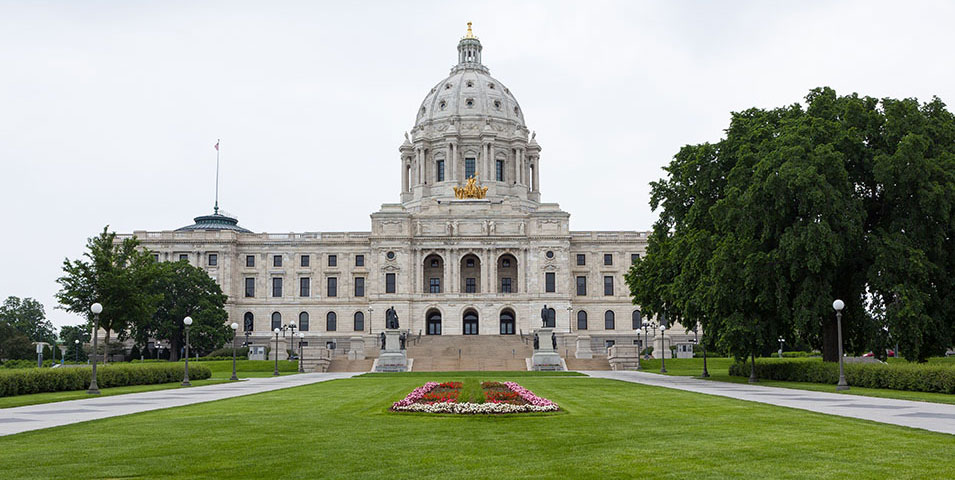Eviction laws in Minnesota are an essential aspect of landlord-tenant relationships and ensure fair treatment and due process for both parties. It is crucial for landlords and tenants to understand the eviction process and their respective rights and responsibilities. In order to provide an updated overview of Minnesota eviction laws, this article will cover the grounds for eviction, notice requirements, recent updates in 2023, important considerations for landlords and tenants, as well as resources and support available.
Starting with an overview of the eviction process in Minnesota, it is important to understand the grounds for eviction. These include non-payment of rent, lease violations, illegal activities on the premises, expiration of lease terms, and other specific reasons outlined in Minnesota statute. The notice requirements for eviction, such as the amount of notice given to tenants before initiating the eviction process, will also be discussed.
In order to stay informed about the latest updates, this article will highlight the new changes to Minnesota eviction laws in 2023. This includes any modifications to the notice periods, eviction moratoriums, and tenant rights and protections. Understanding these updates is crucial for both landlords and tenants to ensure compliance with the law.
For landlords, the article will provide guidance on the necessary steps to follow when evicting a tenant, including legal procedures, documentation requirements, and the importance of adhering to the law. On the other hand, tenants will learn about their rights during the eviction process, such as the right to dispute eviction, the right to proper notice, and any other protections afforded to them under Minnesota law.
Lastly, this article will provide information about resources and support available for both landlords and tenants in Minnesota. This includes where landlords can seek legal assistance, such as contacting a lawyer or a local housing organization. Tenants will find information on where to find help and guidance regarding eviction, ensuring they have access to the necessary resources and support during a challenging time.
By providing an updated and comprehensive guide to Minnesota eviction laws, this article aims to empower landlords and tenants with the knowledge they need to navigate the eviction process smoothly and fairly.
Overview of Eviction Process in Minnesota
The eviction process in Minnesota involves several key steps:
- Serve the Notice: The landlord must start by serving the tenant with a written notice, which could be a Notice to Quit or Notice to Vacate. The type of notice depends on the reason for eviction, such as non-payment of rent or violation of lease terms.
- File an Eviction Lawsuit: If the tenant fails to comply with the notice, the landlord can file an eviction lawsuit, known as an Unlawful Detainer action, at the local district court. The landlord must pay the filing fee and provide relevant documentation.
- Serve the Summons and Complaint: The landlord must serve the tenant with a Summons and Complaint, notifying them of the lawsuit and the date of the eviction hearing. Proper service is crucial, and it can be done by a process server or through certified mail.
- Tenant’s Response: The tenant has the opportunity to respond to the eviction lawsuit by filing an Answer within a specific timeframe. The Answer should state any defenses or counterclaims the tenant wishes to make.
- Eviction Hearing: The court will schedule an eviction hearing where both parties can present their case. It is essential to bring all relevant documents and evidence to support the claims or defenses.
- Court Decision: After considering the evidence and arguments presented, the judge will make a decision. If the judge rules in favor of the landlord, they will issue an Order for Writ of Recovery of Premises.
- Writ of Recovery: If the landlord obtains the Order for Writ of Recovery of Premises, they must wait for the expiration of the Appeal Period before requesting a Writ of Recovery from the court. The writ authorizes the local sheriff to physically remove the tenant from the premises.
- Enforcement: The sheriff’s office will schedule a date to carry out the eviction and remove the tenant if necessary. The landlord should not engage in self-help or use force to evict the tenant.
- Post-Eviction: After the eviction, the landlord may need to store or dispose of any belongings left behind by the tenant, following the guidelines set by the state law.
It is crucial for both landlords and tenants to familiarize themselves with the specific eviction laws in Minnesota and seek legal advice if needed to ensure compliance with the law.
What are the Grounds for Eviction in Minnesota?
In Minnesota, what are the specific grounds for eviction that landlords must adhere to? The grounds for eviction in Minnesota include nonpayment of rent, violation of lease terms, illegal activities on the premises, and failure to vacate the property after the lease has expired. Additionally, landlords can evict tenants for causing damage to the property or engaging in disruptive behavior that interferes with other tenants’ enjoyment of their homes.
If a tenant fails to pay rent, landlords can initiate eviction proceedings after providing a written notice stating the amount owed and giving the tenant a certain number of days to pay. For lease violations and other grounds for eviction, landlords must provide a written notice specifying the lease term that has been violated and give the tenant a reasonable amount of time to remedy the violation.
It is important for landlords to follow the proper legal procedures when evicting a tenant in Minnesota. They must file an eviction lawsuit in court and obtain a court order to legally remove the tenant from the property. It is also essential for landlords to keep records of all communication and documentation related to the eviction process.
Tenants facing eviction should be aware of their rights and responsibilities. They have the right to contest the eviction in court and should consult with a legal professional if needed. Tenants should also ensure they are familiar with their lease agreement and comply with all terms to avoid eviction.
What Notice Requirements are there for Eviction in Minnesota?
In Minnesota, understanding the notice requirements for eviction is essential. Landlords must follow specific guidelines when initiating an eviction. To begin with, they must provide written notice to the tenant, clearly stating the reason for eviction and the corresponding time frame for them to vacate the premises. Whether it is non-payment of rent or violation of lease agreement terms, the grounds for eviction should be explicitly mentioned in the notice. The notice period varies depending on the reason for eviction; typically, it is 14 days for non-payment of rent and 30 days for other violations.
For landlords, serving the notice properly is crucial. They can either personally deliver it to the tenant or send it via certified mail. It is important to retain proof of service for legal purposes.
On the other hand, tenants should carefully review the notice and seek legal advice if they have any questions or concerns. It is equally important for them to be aware of their rights and obligations during the eviction process, including their right to dispute the eviction in court.
Both landlords and tenants should be knowledgeable and understand the notice requirements for eviction in Minnesota. This understanding ensures a fair and legally compliant process.
New Updates to Minnesota Eviction Laws in 2023
The year 2023 brings new updates to the eviction laws in Minnesota. Here are the key changes:
- Extended Notice Period: Landlords are now required to provide tenants with an extended notice period before initiating eviction proceedings. The new law specifies the minimum number of days’ notice based on the reason for eviction.
- Right to Legal Representation: Tenants facing eviction now have the right to legal representation. This ensures that tenants have access to legal advice and representation during eviction proceedings.
- Prohibition on Retaliatory Eviction: The updated laws include provisions that prohibit landlords from retaliating against tenants for exercising their legal rights. This helps protect tenants who report code violations or assert their rights from being unfairly evicted.
- Additional Tenant Protections: The new laws introduce additional protections for tenants, such as limiting the use of eviction records in tenant screening processes and requiring landlords to provide a written explanation for any eviction.
- Mediation and Dispute Resolution: The updated laws encourage the use of mediation and alternative dispute resolution methods to resolve eviction disputes. Landlords and tenants are encouraged to engage in dialogue and explore mutually beneficial solutions before resorting to eviction.
- Enhanced Tenant Education: The updated laws prioritize tenant education by requiring landlords to provide information on tenant rights and responsibilities at the beginning of the tenancy. This helps ensure that tenants are aware of their rights and can better navigate the eviction process if necessary.
- Stricter Enforcement Mechanisms: The new laws strengthen the enforcement mechanisms for violations of eviction laws. Landlords who violate the updated laws may face increased penalties and consequences for their actions.
These updates to the eviction laws in Minnesota aim to provide greater protections and rights for tenants while ensuring a fair and transparent eviction process. Landlords and tenants should familiarize themselves with these changes to stay compliant and informed.
How have the Notice Periods Changed?
In Minnesota, the changes in eviction laws in 2023 have resulted in adjustments to the notice periods. Previously, landlords were obligated to give a 14-day notice for non-payment of rent and a 30-day notice for other lease violations. However, the recent updates now require landlords to provide a revised notice period. Specifically, a 14-day notice is still necessary for non-payment of rent, but a 60-day notice is now mandatory for other lease violations.
The intention behind these alterations to the notice periods is to grant tenants more time to address the underlying issues that gave rise to the eviction process. By extending the notice period, tenants are given extra time to explore alternative housing options and proactively resolve any complications that may have emerged.
A helpful tip for tenants facing eviction is to maintain open lines of communication with their landlords and promptly address any problems as they arise. By addressing concerns proactively and actively working towards finding a mutually beneficial solution, tenants may have the opportunity to prevent an eviction from taking place.
What Changes have been Made to Eviction Moratoriums?
What Changes have been Made to Eviction Moratoriums?
In Minnesota, eviction moratoriums have recently undergone significant changes. The duration of the moratoriums has been extended indefinitely. Previously, the moratoriums were set to expire on a specific date, but now they have been extended until further notice. As a result, landlords are prohibited from proceeding with evictions at this time.
Not only has the duration of the moratoriums changed, but there have also been modifications to the criteria for eligibility. Previously, tenants had to demonstrate financial hardship or other qualifying factors to be protected by the moratoriums. However, the new changes have expanded the criteria to include any tenant facing eviction, regardless of their circumstances. This ensures that all tenants have the opportunity to remain in their homes during the moratorium periods.
Additionally, the process of lifting the eviction moratoriums has been altered. Previously, the moratoriums would automatically be lifted after a certain period of time or when specific conditions were met. However, the new changes require a thorough review of each individual case before the moratorium can be lifted. This ensures that tenants have sufficient time to address any issues that may have led to the eviction and find suitable alternatives.
It is crucial for both landlords and tenants to stay informed about these changes to eviction moratoriums. Landlords should familiarize themselves with the new rules and regulations to ensure compliance, while tenants should be aware of their rights and protections during the moratorium period. Seeking legal assistance or accessing resources specific to eviction laws in Minnesota can provide valuable guidance and support.
By staying informed and understanding the changes made to eviction moratoriums, landlords and tenants can navigate the process more effectively and ensure a fair and just resolution.
Are there any Modifications to Tenant Rights and Protections?
- There have been modifications to tenant rights and protections in Minnesota eviction laws in 2023.
- The notice periods for eviction have been extended, providing tenants with more time to address any issues.
- There have been changes made to eviction moratoriums, offering additional protections for tenants facing eviction.
- Modifications have been made to strengthen tenant rights, ensuring fair treatment during the eviction process.
- Tenants now have access to more legal resources and support to help them navigate the eviction process.
These modifications to tenant rights and protections aim to provide tenants with a higher level of security and ensure a more equitable eviction process.
Important Considerations for Landlords and Tenants
Landlords and tenants in Minnesota should be aware of the following important considerations regarding the updated eviction laws:
- Review the Updated Laws: Familiarize yourself with the latest updates to the Minnesota eviction laws in 2023. Understand the changes and how they may impact your rights and obligations as a landlord or tenant.
- Know Valid Reasons for Eviction: Understand the valid reasons for eviction as outlined in the updated laws. This includes nonpayment of rent, lease violations, property damage, illegal activities, or expiration of lease terms.
- Follow Proper Notice Procedures: Ensure you follow the correct notice procedures when initiating an eviction. The updated laws may specify the type of notice required, the timeframe for response, and any additional requirements.
- Seek Legal Advice: If you have questions or concerns about the eviction process under the updated laws, consider consulting with a legal professional who specializes in landlord-tenant law. They can provide guidance and ensure you comply with all legal requirements.
- Communicate and Document: Both landlords and tenants should maintain clear and open communication throughout the eviction process. Document all interactions, including notices served, responses received, and any agreements or resolutions reached.
- Mediation and Alternative Dispute Resolution: Explore options for mediation or alternative dispute resolution before pursuing eviction. In some cases, resolving conflicts through negotiation or mediation can be more beneficial and less adversarial.
- Understand Tenant Rights: Tenants should understand their rights under the updated laws, including the right to due process, proper notice, and the opportunity to address and rectify lease violations before eviction.
- Seek Assistance if Financially Struggling: If tenants are facing financial difficulties that impact their ability to pay rent, they should explore available resources and assistance programs. Landlords should also consider alternative solutions, such as payment plans, to avoid eviction.
- Stay Informed: Stay updated on any further changes or amendments to the eviction laws in Minnesota. Regularly check reliable sources, such as government websites or legal publications, for the latest information.
- Consult Local Resources: Utilize local resources such as tenant advocacy organizations, legal aid services, or housing agencies that can provide guidance and support regarding the updated eviction laws.
By considering these important factors, landlords and tenants in Minnesota can navigate the updated eviction laws more effectively and ensure compliance with the legal requirements.
What Steps should Landlords Follow to Evict a Tenant?
When evicting a tenant, landlords need to follow a specific set of steps to ensure a legal and smooth process. Here are the steps that landlords should follow:
1. What Steps should Landlords Follow to Evict a Tenant? Provide written notice: Start by providing the tenant with a written notice specifying the reason for eviction. This could include non-payment of rent, violation of lease terms, or illegal activities.
2. Wait for the notice period to end: Allow the tenant a specific period of time mentioned in the notice to either rectify the issue or vacate the property.
3. File an eviction lawsuit: If the tenant fails to comply with the notice or vacate the property, the landlord should file an eviction lawsuit in the appropriate court.
4. Appear in court: Attend the court hearing on the scheduled date and present the case against the tenant.
5. Obtain a judgment: If the court decides in favor of the landlord, they will receive a judgment stating that the tenant must leave the property.
6. Arrange for law enforcement: If the tenant still refuses to leave, landlords should coordinate with local law enforcement to enforce the eviction order and physically remove the tenant from the property.
7. Secure the property: After the tenant has been evicted, landlords should change the locks and secure the property to prevent unauthorized entry.
8. Determine financial obligations: Assess any outstanding rent or damages and communicate with the tenant regarding financial obligations.
9. Re-lease the property: Once the eviction process is complete, landlords can start looking for new tenants to occupy the property.
Following these steps will help landlords navigate the eviction process in a lawful and fair manner.
What Rights do Tenants have during the Eviction Process?
During the eviction process, tenants have several rights that they can exercise to protect themselves. First and foremost, tenants have the right to receive proper notice before eviction proceedings can begin. In Minnesota, landlords must provide tenants with a written notice stating the grounds for eviction and the amount of time the tenant has to remedy the situation or vacate the premises.
Tenants also have the right to contest the eviction in court. If the tenant believes that the eviction is unjust or that the landlord has not followed proper procedures, they can present their case before a judge. The judge will evaluate the evidence and make a decision based on the law and the facts presented.
Tenants have the right to remain in their rental unit until a court order is obtained. This means that even if the landlord initiates eviction proceedings, the tenant can continue to occupy the property until a judge issues a ruling in favor of the landlord.
Tenants have the right to seek legal representation during the eviction process. It is highly recommended that tenants consult with an attorney who specializes in landlord-tenant law to ensure their rights are protected and to navigate the legal complexities of an eviction case.
It is crucial for tenants to understand their rights and options during the eviction process to ensure a fair and just outcome.
What Rights do Tenants have during the Eviction Process?
Resources and Support for Landlords and Tenants in Minnesota
For landlords and tenants in Minnesota, there are various resources and support available to navigate the state’s eviction laws and ensure a fair and smooth rental experience. Some key resources include:
- Minnesota Judicial Branch: The Minnesota Judicial Branch website provides comprehensive information on eviction processes, forms, and resources for both landlords and tenants. It offers guidance on filing eviction cases, understanding legal rights and responsibilities, and accessing relevant court forms and documents.
- Housing Counseling Agencies: Several non-profit organizations and housing counseling agencies in Minnesota offer free or low-cost assistance to landlords and tenants. These agencies provide guidance on navigating rental disputes, understanding eviction laws, and accessing resources for affordable housing.
- Legal Aid Organizations: Legal aid organizations such as the Legal Aid Society of Minneapolis and the Legal Services State Support provide free legal assistance to low-income individuals and families. They can help tenants understand their rights, respond to eviction notices, and represent them in court if necessary.
- Tenant Associations: Tenant associations and advocacy groups in Minnesota, such as the Minnesota Tenants Union, offer support, education, and resources for tenants facing eviction. They can provide guidance on tenant rights, negotiating with landlords, and accessing emergency housing assistance.
- Landlord Associations: Landlord associations like the Minnesota Multi Housing Association provide resources and support for landlords. They offer educational programs, legal guidance, and networking opportunities to ensure landlords are well-informed about their rights and responsibilities.
- City and County Resources: Many cities and counties in Minnesota have their own housing departments or community development agencies that provide information and resources related to rental housing. These resources may include rental assistance programs, mediation services, and tenant-landlord dispute resolution.
By utilizing these resources and seeking support from relevant organizations, landlords and tenants in Minnesota can navigate the state’s eviction laws more effectively, resolve disputes, and ensure a fair rental environment for all parties involved.
Where can Landlords Seek Legal Assistance?
In Minnesota, landlords seeking legal assistance can turn to various sources for support and guidance. If you are a landlord in Minnesota and wondering where you can seek legal assistance, there are several options available to you.
One option is to consult with a qualified attorney specializing in landlord-tenant law. These legal professionals have extensive knowledge in this area and can provide expert advice on eviction procedures, tenant rights, and any recent updates to Minnesota eviction laws. By consulting with an attorney, you can ensure that you navigate the eviction process in compliance with the specific laws of Minnesota and protect your rights as a landlord.
Another resource for landlords seeking legal assistance is legal aid organizations. These organizations offer free or low-cost legal services to individuals who meet their eligibility criteria. You can reach out to local legal aid organizations in Minnesota and inquire about their services. They may be able to provide you with assistance in eviction cases and other landlord-related legal matters.
Additionally, landlords can access online legal forums and communities that are specifically tailored to landlord-tenant matters. These platforms provide an opportunity for landlords to connect with legal experts, ask questions, and receive guidance on eviction-related issues. However, it is important to remember that the information provided on these platforms may not always be accurate or up to date. Therefore, it is recommended to verify the credibility and reliability of the information and consult a qualified attorney for precise legal advice.
To summarize, landlords in Minnesota have multiple options for seeking legal assistance. Whether it is consulting with attorneys, contacting legal aid organizations, or joining online landlord-tenant communities, seeking legal advice is crucial to ensure that you comply with Minnesota eviction laws and protect your rights when dealing with tenant-related disputes.
Where can Tenants Find Help and Information about Eviction?
Tenants in Minnesota who are seeking help and information about eviction can find assistance through various resources. One option is to reach out to local legal aid organizations, including the Legal Aid Society of Minneapolis or Southern Minnesota Regional Legal Services. These organizations offer free or affordable legal support to tenants facing eviction. Another valuable resource is the Minnesota Judicial Branch website, which provides eviction process guides and information on tenant rights. Tenants can also seek guidance and support from local tenant advocacy organizations such as HOME Line or the Tenant Resource Center.
For tenants seeking help and information about eviction, it is advisable to gather and organize all relevant documents. This includes their lease agreement, any notices received from the landlord, and any communication related to repairs or maintenance issues. Having these documents readily available will assist tenants when consulting with legal aid organizations or presenting their case in court. It is also important for tenants to maintain records of any interactions or conversations with their landlord regarding the eviction, as this evidence can support their defense. By being prepared and informed about their rights, tenants can effectively navigate the eviction process and stand up for themselves.
Some Facts About Minnesota Eviction Laws: 2023 Update:
- ✅ Minnesota has passed new laws to support tenants’ rights. (Source: Our Team)
- ✅ These new laws will be the most significant change in Minnesota tenant/landlord law in the state’s 165-year history. (Source: Our Team)
- ✅ Most of the new policies will become effective on January 1, 2024. (Source: Our Team)
- ✅ Minnesota renters will benefit from new tenant protections advocated for by HOME Line. (Source: Our Team)
- ✅ Minnesota has allocated a $1 billion-dollar investment in housing policy, which includes changes to the landlord-tenant law. (Source: Our Team)
Frequently Asked Questions
What are the new tenant protections for Minnesota renters according to the 2023 update?
According to the 2023 update, Minnesota renters will benefit from new tenant protections that include several significant changes. These changes include a requirement for landlords to maintain a minimum temperature of 68 degrees in rental units from October to April, a ban on landlords requiring tenants to declaw or devocalize their pets, a prohibition on landlords forcing early lease renewals, and the allowance of cannabis in rental units (with smoking/vaping still potentially banned). These laws will take effect in 2024.
What is the timeline for the implementation of the new tenant/landlord laws in Minnesota?
Most of the new tenant/landlord laws in Minnesota will become effective on January 1, 2024. This includes the changes to eviction processes, the minimum temperature requirement, and other tenant protections. Landlords and renters should be aware of these changes and familiarize themselves with the updated laws.
Where can I find more information about the new tenant/landlord laws in Minnesota?
For more information about the new tenant/landlord laws in Minnesota, including a detailed summary of the policies, you can visit the website of HOME Line, an organization that advocated for these protections. They offer a downloadable/printable summary of the new policies, which will help renters understand their rights and responsibilities under the updated laws.
Will there be public education seminars to inform renters about their new rights?
Yes, HOME Line will be hosting free public education seminars to inform renters about their new rights under the updated tenant/landlord laws in Minnesota. These seminars will cover the changes in the legislation, including the new pre-eviction notice requirement for certain eviction actions. Webinars on the new laws will be held on various dates starting from June 2023, and recordings will be available on the website for those unable to attend.
Can I get Continuing Legal Education (CLE) credits for attending the webinars on the new tenant/landlord laws?
Yes, CLE credits will be available for each webinar on the new tenant/landlord laws in Minnesota. This means that legal professionals can earn educational credits by attending and participating in these informative sessions. It offers a great opportunity for lawyers and other legal professionals to stay updated on the changes in the law and enhance their knowledge in this area.
Where can I find the legislative session details and specific laws related to Minnesota tenant/landlord rights?
The specific laws related to Minnesota tenant/landlord rights can be found in the Minnesota Session Laws 2023 Regular Session, Chapter 52, Article 19, Parts F through J, under the section titled “Tenant’s Rights.” Reading these statutes will provide a detailed understanding of the changes and updates made to the tenant/landlord laws during the legislative session.
Dave is a seasoned real estate investor with over 12 years of experience in the industry. Specializing in single-family residential real estate, David’s strategic approach combines market analysis, financial acumen, and a deep understanding of urban development trends to maximize investment returns.










